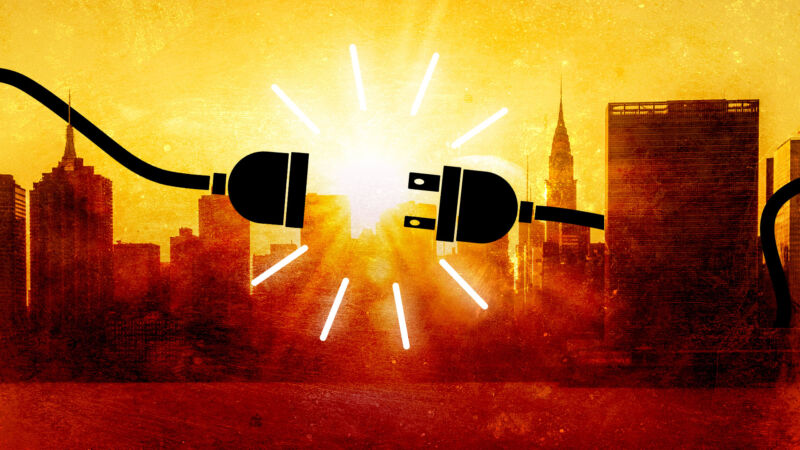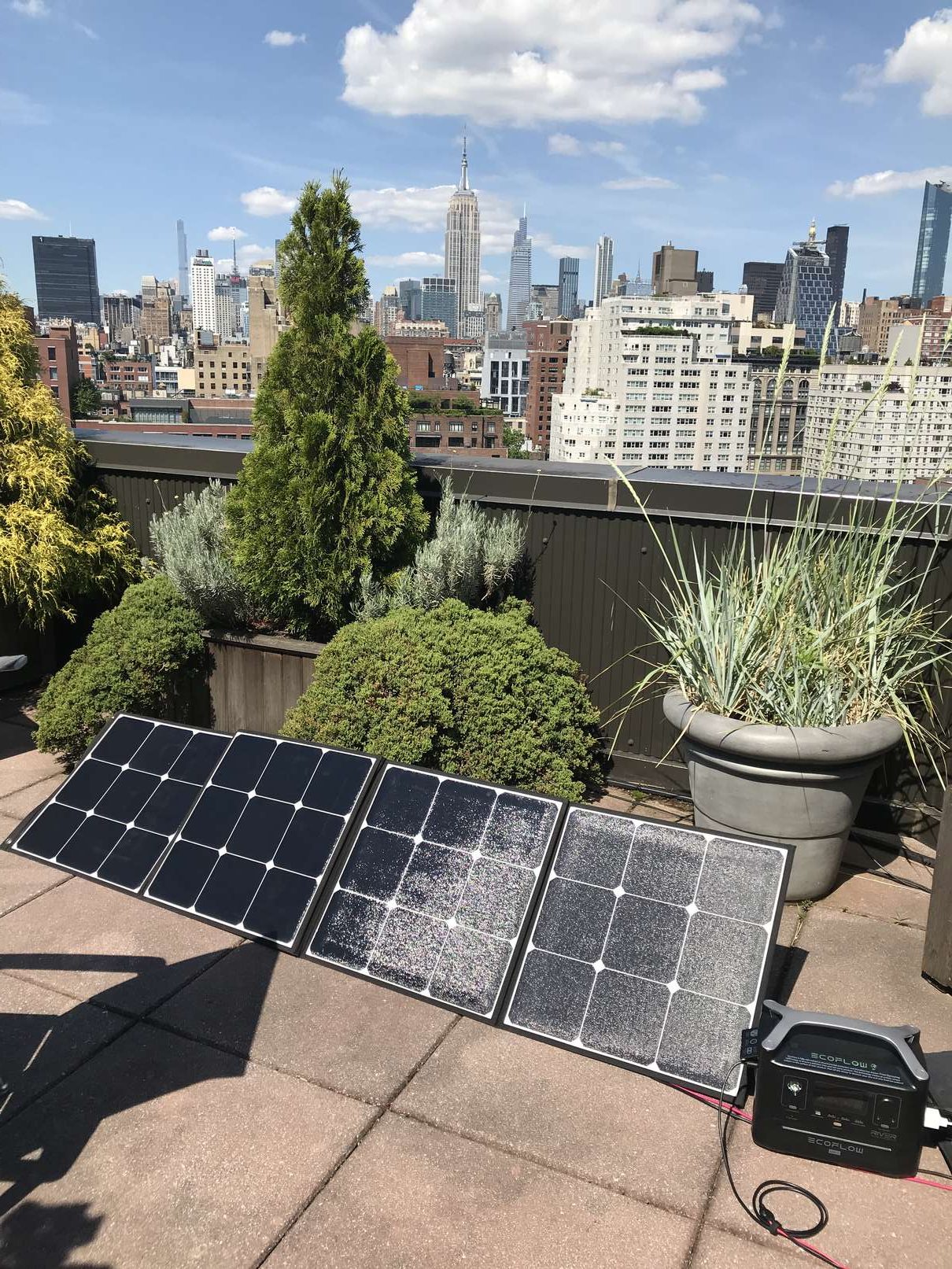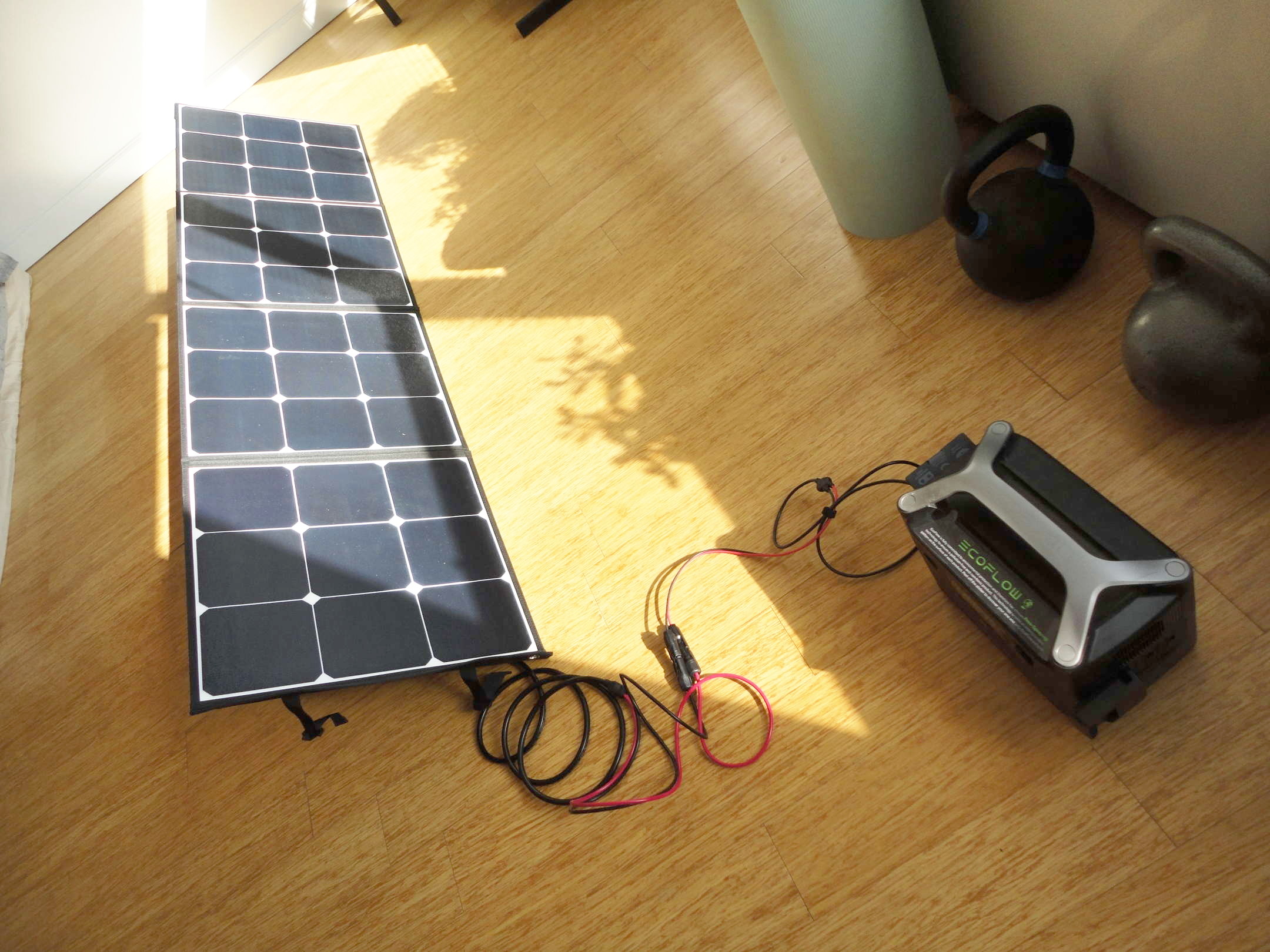
On May 22, 2022, I began an experiment. I unplugged everything in my apartment, with the goal of drawing zero power from the electric grid for one month. I had no idea how I would make it past a few days.
Nevertheless, I opened the main circuit, disconnecting my apartment from the grid and committing myself to solving what problems arose as they came. As I type these words in January, I’m in my eighth month. My Con-Ed bills continue to show zero kilowatt-hours.
Ars Technica readers undoubtedly want to know about my equipment. We’ll get there, but first let me share my history, motivation, and constraints.
Why would I do this?
Today, more than half the world lives in cities. I've always thought that living "off the grid" meant living "off in the woods," where you can live simply and set up an alternate power source. But I’m a professional in Manhattan and need to earn a living. I have to meet the expectations of professional service from my clients and from New York University, where I teach leadership and entrepreneurship. Before this experiment, I didn’t believe my lifestyle would let me disconnect from the grid for a day, let alone longer.
But that sort of thinking was in tension with my work. Over the years, I have helped leaders in business, politics, and other fields learn to lead on sustainability. These leaders can then change their organizations’ and constituencies’ cultures and practices to embrace sustainability. Even though corporate and policy choices matter more than those of any individual, I was still curious to see if I could make my own practices more sustainable. Personal responsibility matters to me, so polluting less motivates me; it's a small thing, but one I can control, even if it's important to make policy and political changes, too.
And I wanted to see how easy (or difficult) this might be for other city dwellers—both to help with sustainability and with utility bills. The Wright brothers didn’t need to make a 747 or a global network of airports to show that controlled powered flight had potential. Showing success once created the mindset shift that led to a process of continual improvement among innovators, who did the rest. So who knows? Perhaps my story will inspire a few innovators (maybe even you!).
In addition to the obvious benefits that reduced power consumption brings, there’s also the issue of grid resilience. If everyone could stand a few days without grid power, we could build grids that aren't made for 99.9 percent uptime but for 95 percent or lower uptime (with dedicated power for essential services like hospitals, police, and subways). At some level of local resilience, we could power cities exclusively with solar and wind despite their intermittency, with much lower battery needs.
Unplugging gradually
I started my personal sustainability drive almost accidentally, when I challenged myself to avoid packaged food for a week. I expected deprivation and sacrifice from avoiding Manhattan’s abundant food options. If I’m honest, part of me hoped to find the challenge untenable so I could say the cure was worse than the disease and give up.
But constraints breed creativity. I learned to cook from scratch, which led to more of what I valued in food: flavor, variety, convenience, nutrition, and socializing, while lowering costs and pollution.
The unexpectedly rewarding results motivated me to keep going. I avoided flying for a year and experimented with unplugging my fridge. By May 2022, when I decided to disconnect completely, I hadn’t filled a load of trash since 2019, hadn’t flown since 2016, had unplugged my fridge for eight months, and had electric bills consistently under $2 (not counting fixed connection charges of about $18).

Each change forced me to apply new skills but brought new benefits as well. One illustrative example was my progression from 1) limiting social media to 2) avoiding one or two specific time-wasting sites to 3) avoiding all sites that refresh at least daily (with some exceptions) to 4) making airplane mode almost the default for my cell phone. Each step made the next clear and simple. Now I don’t see myself going back. In addition to regaining lost time, I live with more intention, less hope to be passively entertained—and frankly, less addiction.
My other experiments followed similar patterns. I couldn’t reduce consumption in three significant areas since I don’t own a car, I was already vegan, and I have no children. Still, I sold my TV, reduced my use of appliances, bought less stuff, and reduced heating and air conditioning. Contrary to my expectations, these moves created freedom, joy, and fun.
I started wondering if I could do a month on zero kilowatt-hours from the grid.
Constraints
I had no hands-on experience with solar equipment, but I have a PhD in astrophysics and own a few patents, so I understand power, energy, and technology. I wasn't going to wait for my building’s board to approve a permanent installation of solar panels, and my apartment receives little direct sunlight. I’m single, so I could act unilaterally, but I had no access to economies of scale.
I searched Craigslist for used solar equipment, which meant the pickings were slim. I settled on using portable panels and a portable power station—a fancy name for a battery with many options to power and to be powered. I settled on a 576-watt-hour power station by Ecoflow and a 200-watt foldable panel by Bluetti, both used, discounted about 30 percent from retail.
That’s it.
I had no idea if that capacity was high or low—one point of the experiment was to find out. I allowed myself one cheat: I could plug in my laptop and phone when working at New York University. Otherwise, my only electric power came from the solar panel and battery. I still used my building’s hot water but not my gas stove.
Did the constraints hold me back? On the contrary, they forced me to keep trying until I found what worked.
What happened
The experiment wasn’t easy. I had to remind myself that my goal was to develop a proof of concept. My building is 15 stories, and using the elevator would undermine the experiment, so I climbed 11 flights of stairs—twice on days that I charged—three or four days per week. I’m 51, so this could be a slog.
I learned that my setup was underpowered for my needs, but I was determined to make it work. I learned to time my activities around the sun. In direct sunlight, the panels fully charged the battery in about four hours. A cloudy day could mean the battery wouldn’t fully charge, but between planning and my NYU cheat, I missed zero meetings.
Some changes that made the experiment work included reading more books, writing by hand, choosing salads over cooked foods, going out instead of staying in, and shifting work to daytime hours. At first, I considered these changes sacrifices, but looking back, I view them more as a cultural shift, a bit like when I lived overseas and couldn’t find a good bagel. Finding the local equivalent—croissants in Paris or vegetable steamed buns in Shanghai—worked better than complaining, and it expanded my world.
Whenever I was tempted to lament the sacrifices I was making, I reminded myself that people have been living in Manhattan for around 10,000 years—technology shouldn’t make me less able or resilient than them.
The one thing I couldn’t sacrifice was my pressure cooker, which was the most efficient way to cook (and my greatest single consumer of energy). A full battery charge would power the cooker to make stew good for five meals and still leave a couple of hours’ charge for my computer and phone. I used almost no other appliances. I began waking up with the sun at 5 am to avoid needing lights. My battery has a one-watt LED that sufficed for cooking and eating, so I haven’t used my floor lamp.
I ate more greens and uncooked food. I fermented more, too. Growing up, my family didn’t do this, so I had to learn—from online tutorials first, then through finding others who were into fermentation. I started by salting cabbage to make sauerkraut, then vinegar from chopped apples in water. With experience, I expanded to kombucha, chutney, and more. I sprouted grains and legumes to make them edible (and delicious) without cooking.
There were unexpected benefits. All the stair climbing freed up time from my regular periods of jogging and cardio exercise. Avoiding power-hungry videos online freed a surprisingly large amount of time, leading to more reading, writing, and volunteering in my community. I wrote more by hand, which I believe improved my writing. I made more progress on my book than I expected. All these things saved money and time. That surprised me at first, but now the benefits seem obvious.
Not everything was simple, of course.
Challenges
My first big challenge came from three rainy days in a row. No solar power meant cutting back on everything except client meetings, scheduled podcast recordings, and judiciously using my NYU cheat.

My second big challenge was that my equipment broke—the panel once and the battery twice. I recorded a podcast episode when they broke, saying that I was about to “declare victory”—that is, give up—and reconnect. But after recording, I saw I had enough food that didn’t need cooking, so I was able to make it through another day. I hung on until replacements arrived from the manufacturers, which took over a month, since buying my devices in used condition meant I didn’t have receipts.
My power system wasn’t the only thing that presented problems. My laptop battery also broke, as did its charger. I can’t tell if they broke due to the experiment, but they’ve never broken before.
Regarding my NYU cheat, I found ways to reduce NYU’s consumption to compensate for what I used, like turning off lights and unused public terminals. It’s possible that, at least for this experiment, my net power use at NYU was negative—though that's not likely, and I still relied on grid power there.
Lessons
Here are some lessons I learned, in no particular order.
Intermittency is no joke! Before this experiment, when people criticized wind and solar for their unreliability, I minimized the issue, pointing out how much solar energy hits the Earth. But nothing compares with experiencing intermittency on a personal level.
One thing I learned is that a larger battery (700 to 1,000 watt-hours) would probably be worth it. Asking for receipts when I bought my used equipment could have saved weeks when they needed replacement. More food preparation skills would have helped at the start.
Attitude was more important than technology, though. Attitude made my setup doable. I’m not suggesting that "because I could do it, you can do it," but I did tell myself that if humans could do without power for 300,000 years, then I could do so for a month.
The experiment inspired me to learn from indigenous cultures about their practical knowledge of doing without power, including from guests on my podcast who lived among the San in the Kalahari Desert, Hadza in Tanzania, Kogi in Colombia, Tsimane in Bolivia, and Matsés in Peru. Some cultures have lived tens to hundreds of thousands of years with no electrical power—talk about resilience—and continue to choose not to adopt it.
From them, I learned to appreciate cultural activities with friends, family, and community, like preparing food, making clothes, gathering plants, singing, dancing, and storytelling. I switched from seeing these things as luxuries to experiencing them as time and money savers. I still live in Manhattan, but I now feel I’m living in a different culture, one that values resilience, creativity, humility toward nature, and responsibility to others affected by my actions.
My top goal
Regardless of any wider effects of my experiment, it has been important to me personally. A biography of Abraham Lincoln led me to a quote of his: “Nothing is more damaging to you than to do something that you believe is wrong.” In polluting as much as I was for my comfort and convenience, I was doing something I believed was wrong. Resolving that issue has at least helped me sleep better at night.
But I hope it has wider results.
I started calling the experiment my Kitty Hawk moment in honor of the Wright brothers’ first controlled powered flight. Technically, Kitty Hawk was their headline-making breakout, so my experiment was more like an earlier Wright brothers test, after which they saw their success as inevitable.
With Kitty Hawk, the brothers showed the world what was possible. You could argue that they failed, as their plane couldn’t transport other people or cargo, it wasn’t safe, and it couldn’t go far. And they didn’t create an airport, let alone a global network.
You could say their individual action didn’t matter and that only governments and corporations could act on the necessary scale. (And large-scale energy changes will indeed need to come from the top.) But the Wrights shifted the world’s mindset, leading to a global process of continual improvement. They unleashed others to act, leading to then-unimaginable results.
And that’s what I hope to see. I would love for people to read this article and think, “You can do that? I want to try!”... and then outdo me.
Joshua Spodek, PhD, MBA, hosts the This Sustainable Life podcast. He is a four-time TEDx speaker, the author of Initiative and Leadership Step by Step, and an adjunct professor at NYU.
"electric" - Google News
January 13, 2023 at 06:45PM
https://ift.tt/B9NgEk1
I disconnected from the electric grid for 8 months—in Manhattan - Ars Technica
"electric" - Google News
https://ift.tt/oAi1vEn
https://ift.tt/s0Y9qcm
Bagikan Berita Ini














0 Response to "I disconnected from the electric grid for 8 months—in Manhattan - Ars Technica"
Post a Comment